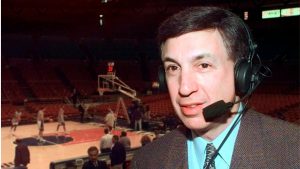I got a little thrill the other night when I came across Marv Albert calling a Knicks playoff game on TNT. They ended up losing the game and being eliminated from the post-season, but just hearing that voice doing play-by-play for that team sent my mind reeling back to my youth.
Albert was the voice of the Knicks when I was growing up on Long Island. That was an era when NBA games were not televised, except for the Finals, which were tape-delayed in the home market to air at midnight! Thus, the only way to know how the team was doing was to go to Madison Square Garden (which we couldn’t afford) or listen to Albert’s call on the radio (which we could).
At the time, Albert’s schedule was remarkable. He was the sportscaster on the WNBC-TV newscasts. From October to May, when he’d finished the 6pm show, he’d go over the the Garden to broadcast either the Knicks or Rangers home game on radio — solo, with no analyst at his side. When it was over, he’d go back to 30 Rock and do the 11pm local news, which included highlights of the game he’d just announced.
For kids of my age, Albert’s voice was so omnipresent that when we’d play basketball or street hockey, we didn’t pretend to be any particular NBA or NHL player. We were ourselves, but with Marv broadcasting our actions (“Harris switches hands on the dribble, moves to the top of the key, puts up a jumper — YES!”). Local schools had competitions for who could do the best imitation of Marv.
When I was 11, the Knicks made it to the NBA Finals against Wilt Chamberlain’s LA Lakers. The series was tied at 3-3. My parents were out for the night, so I was stuck at home keeping an eye on my brother Seth, who was 7. Fortunately, he went to bed early, so I could concentrate on helping the Knicks win the title. I went into my parents’ bedroom, sat on their bed, and started tossing my father’s old key case up in the air and catching it. As soon as I did, the Knicks went on a run, with Marv emphasizing every basket as he painted beautiful word pictures from courtside.
And then he said it. Three words that sent a shiver down the backs of all Knicks fans in the metropolitan area: “Here comes Reed!” The team’s center, Willis Reed, had suffered a thigh injury that knocked him out of game five and kept him from playing in game six. In Reed’s absence, the Knicks had no answer for Chamberlain, who put up 45 points and took down 27 rebounds in that sixth game. But now, the captain was limping out of the locker room and headed for a seat next to his teammates. And he was in uniform!
I threw the key case higher, almost to the ceiling, and caught it again, my adrenaline rising as Marv’s excitement matched the roar of the Garden crowd. It was the spark the Knicks needed. They went on to win the game and their first NBA championship.
A few minutes later, my parents came home to find me ecstatic. They couldn’t have cared less about sports, but they recognized that this was a special occasion, so they let me stay up a little late to watch the 11pm news — which led with Marv reporting on the Knicks victory in that inimitable voice. Somehow, he forgot to mention the importance of my key case tossing in the team’s success.
Marv went on to a long career doing play-by-play of all sorts of sports, including eight Super Bowls, two World Series, seven Stanley Cup finals, and Wimbledon. But he was always at his best calling the action on the hardwood. He not only fathered Kenny, who went on to work behind the microphone and on camera, but also spawned a legion of broadcasters who copied his style all over the country (including his brothers, Steve and Al). Of course, he was also one of the most popular recurring guests on David Letterman’s TV shows.
Now 79 years old, Marv has announced he’s retiring when his post-season duties are completed. But his iconic voice will linger in the memories of many sports fans for a long time to come.

